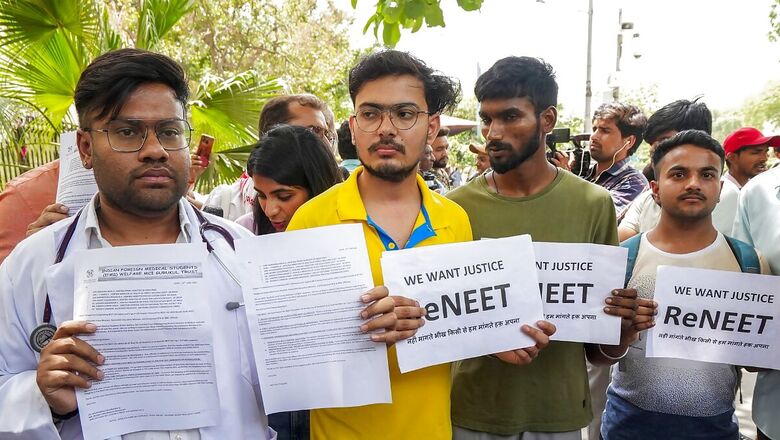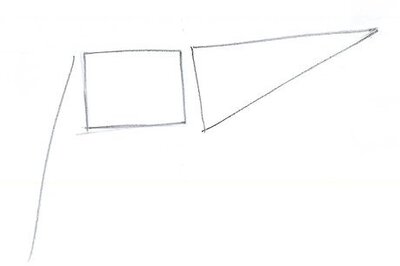
views
Can the National Eligibility-cum-Entrance Test (NEET-UG) be conducted on the lines of the Joint Entrance Examination (JEE) model as a computer-based test? News18 asks experts.
For such a large and high-stakes exam like NEET, experts say, it must be conducted on two levels, with one phase of screening and the second phase could be the final qualifying exam. This is crucial at a time when the Centre is reportedly considering holding NEET-UG in the online mode from next year.
While NEET is conducted for admissions to undergraduate medical courses, JEE (Main) and JEE (Advanced) are for engineering colleges such as the premier IITs and the NITs at the undergraduate level.
V Ramgopal Rao, former director, IIT-Delhi and current Group Vice-Chancellor, BITS Pilani campuses, said that such an examination must be spread out in phases, with AIIMS-like institutions being tasked to conduct the final exam.
The NEET complexity
Over 23 lakh candidates (growing at 10% every year) take the exam, conducted in 13 languages at over 5,000 centres in the pen-and-paper mode across country for admission to top government medical colleges such as AIIMS as well as private colleges.
No pen and paper; online exam spread over multiple sessions
Rao said that conducting a pen and paper-based exam across so many centers by transporting multiple sets of physical question papers in various languages is impractical. Unlike academic institutions that use their own faculty and staff for exams, the National Testing Agency (NTA), which conducts the exam, relies on third-party vendors and contract staff. Ensuring the integrity of so many people for such a high-stakes exam is challenging and risky.
Now, conducting an online exam for 23 lakh students in a single day is not feasible, as the maximum number of secure computer terminals available per session is about 2.5 lakh, he said.
“There is also only one vendor who can provide this infrastructure. The JEE Advanced exam, the largest computer-based test in the country, accommodates no more than 2 lakh students,” said Rao.
What could be the solution?
Reducing the stakes involved by implementing a two-level exam system, said Rao.
Level I – a screening exam for NEET
“Similar to JEE Mains, a screening exam for NEET can be conducted by the NTA over multiple sessions in a computer-based mode. Each batch can accommodate about 2 lakh students, with exams spread over two months using a large question bank,” he said.
Each student gets a unique set of questions arranged randomly, reducing the risk of paper leaks. Ensuring computer security against hacking is crucial and achievable with expert help. Allow students to take the exam twice, considering the best score for shortlisting. Make scores available immediately after the exam. Normalisation is not a challenge as it’s only a shortlisting exam, he added.
Level II- qualifying exam for NEET
Just in case of JEE, NEET-Advanced could be the final qualifying exam. For about 2.5 lakh candidates shortlisted through NEET screening exam, conduct NEET-Advanced, managed entirely by a country’s top medical institute like AIIMS. In case of JEE-Advanced, the entire conduct of the exam is in the hands of the IITs from setting of question paper to holding the test and announcing results, which allows for a high-quality exam.
“This computer-based test, similar to JEE-Advanced, should probe understanding of concepts. Institutional ownership and commitment are essential to maintain sanctity and integrity. Important to have AIIMS own and take control of NEET-Advanced. After exhausting the top scorers, the remaining candidates depending on score can be considered for private colleges,” he said.
What else needs to be done?
Rao also recommended turning NTA into a constitutional body similar to the Union Public Service Commission (UPSC), leaving exams and to educationists through this body.
What makes JEE a better and high-quality test?
While JEE (Mains), which is the shortlisting exam is conducted by the NTA, admission to IITs is based on scores achieved in JEE-Advanced, which is conducted by the IITs itself. The exam is held in multiple sessions over days.
“There is a vast difference in the quality of the question paper in JEE (Mains), which is set by experts from tier-2 and tier-3 institutions. There have been instances of questions being repeated in different years. The quality and difficulty level of JEE-Advanced question paper is higher and in the history of this exam, there has been no question repeated in any session,” said an admissions committee member at a top IIT, who didn’t wish to be named.
An exam like NEET must have this kind of quality held up by a tightly knit system dedicated to the conduct of this test only, the faculty member added.
Stay ahead with all the exam results updates on News18 Website.

















Comments
0 comment